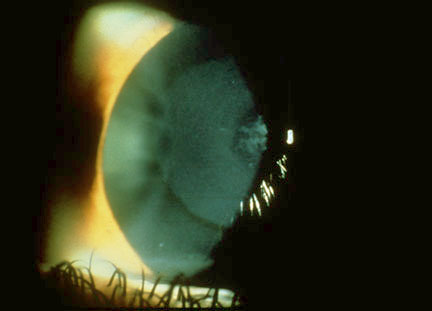Case Studies in Ophthalmology
Cases for the Ophthalmology Clerkship
Note to Medical Students on the Ophthalmology Rotation at the University of Iowa:
Print the question and answer sheet (Ctrl-Print or Command-Print) and enter your answers on it. You may prefer to type your answers on this page and then print it. If you do this, be careful that your full answer shows in the printout. Experience with Internet Explorer has been less than optimal.
Return the printed copy with your answers to Michelle Snyder or Dr. Kemp via campus mail (11290 PFP) or scan as a pdf and email to Michelle at michelle-r-snyder@uiowa.edu or Dr. Kemp at pavlina-kemp@uiowa.edu.
Case #29 Keratoconus
History
A 22 year old man presents to your office with a one year history of not being able to see well out of his glasses. He feels this has been a slow but progressive occurrence. His past medical history is significant for allergies to pollen, dust, certain detergents, and cat hair. He has had no previous ocular problems.
Photo #1: slit lamp examination

Photo #2

Enter Full Name (required):
Your email address (required):
Question #1
What tests would you do during your examination in order to establish a diagnosis?
Question #2
What corneal findings would you expect to see?
Question #3
What are the treatment options for this patient?
Question #4
Would you expect the patient ot see better out of glasses, soft contact lenses or hard contact lenses?
Question #5
Will the patient have to worry about his children having the same problem?
References
Grayson M: Diseases of the Cornea. Second Edition, St Louis, CV Mosby Co. 1983, pp 256-260.
Krachmer JH, et al. Corneal thinning disorders. Surv Ophthalmol 1984; 28:301-322.
Duane TA: Cllinical Ophthalmology. 1987; Vol 4 Chpt 16 pp 36-39.
Lembach RG: Keratoconic and post-keratoplasty contact lens. In Cornea, Refractive Surgery, and Contact Lens. pp 205-216.